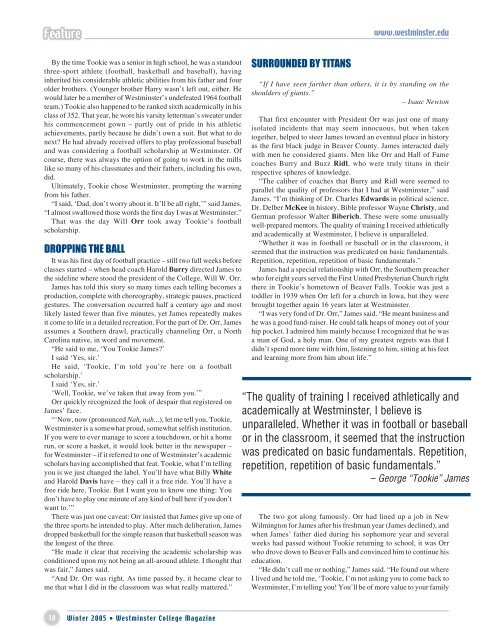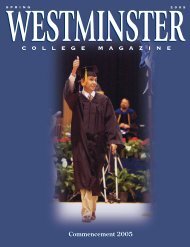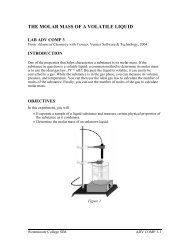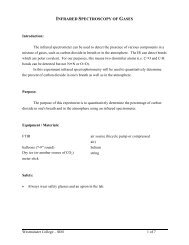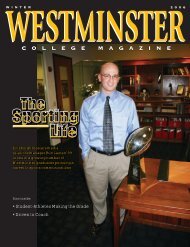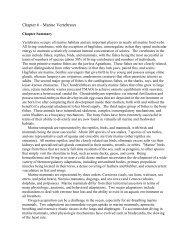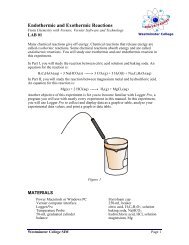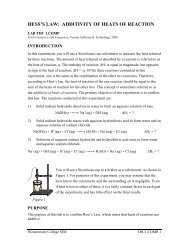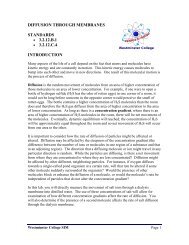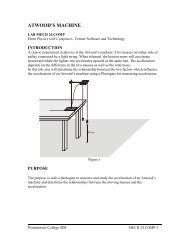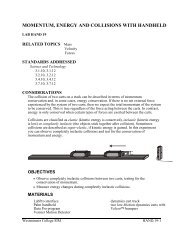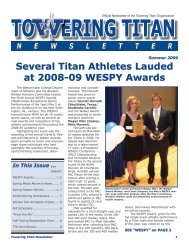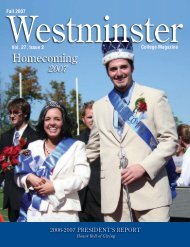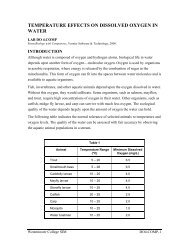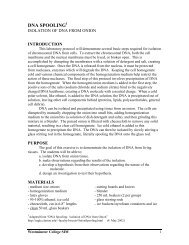download pdf - Westminster College
download pdf - Westminster College
download pdf - Westminster College
Create successful ePaper yourself
Turn your PDF publications into a flip-book with our unique Google optimized e-Paper software.
www.westminster.edu<br />
By the time Tookie was a senior in high school, he was a standout<br />
three-sport athlete (football, basketball and baseball), having<br />
inherited his considerable athletic abilities from his father and four<br />
older brothers. (Younger brother Harry wasn’t left out, either. He<br />
would later be a member of <strong>Westminster</strong>’s undefeated 1964 football<br />
team.) Tookie also happened to be ranked sixth academically in his<br />
class of 352. That year, he wore his varsity letterman’s sweater under<br />
his commencement gown – partly out of pride in his athletic<br />
achievements, partly because he didn’t own a suit. But what to do<br />
next? He had already received offers to play professional baseball<br />
and was considering a football scholarship at <strong>Westminster</strong>. Of<br />
course, there was always the option of going to work in the mills<br />
like so many of his classmates and their fathers, including his own,<br />
did.<br />
Ultimately, Tookie chose <strong>Westminster</strong>, prompting the warning<br />
from his father.<br />
“I said, ‘Dad, don’t worry about it. It’ll be all right,’” said James.<br />
“I almost swallowed those words the first day I was at <strong>Westminster</strong>.”<br />
That was the day Will Orr took away Tookie’s football<br />
scholarship.<br />
DROPPING THE BALL<br />
It was his first day of football practice – still two full weeks before<br />
classes started – when head coach Harold Burry directed James to<br />
the sideline where stood the president of the <strong>College</strong>, Will W. Orr.<br />
James has told this story so many times each telling becomes a<br />
production, complete with choreography, strategic pauses, practiced<br />
gestures. The conversation occurred half a century ago and most<br />
likely lasted fewer than five minutes, yet James repeatedly makes<br />
it come to life in a detailed recreation. For the part of Dr. Orr, James<br />
assumes a Southern drawl, practically channeling Orr, a North<br />
Carolina native, in word and movement.<br />
“He said to me, ‘You Tookie James?’<br />
I said ‘Yes, sir.’<br />
He said, ‘Tookie, I’m told you’re here on a football<br />
scholarship.’<br />
I said ‘Yes, sir.’<br />
‘Well, Tookie, we’ve taken that away from you.’”<br />
Orr quickly recognized the look of despair that registered on<br />
James’ face.<br />
“‘Now, now (pronounced Nah, nah...), let me tell you, Tookie,<br />
<strong>Westminster</strong> is a somewhat proud, somewhat selfish institution.<br />
If you were to ever manage to score a touchdown, or hit a home<br />
run, or score a basket, it would look better in the newspaper –<br />
for <strong>Westminster</strong> – if it referred to one of <strong>Westminster</strong>’s academic<br />
scholars having accomplished that feat. Tookie, what I’m telling<br />
you is we just changed the label. You’ll have what Billy White<br />
and Harold Davis have – they call it a free ride. You’ll have a<br />
free ride here, Tookie. But I want you to know one thing: You<br />
don’t have to play one minute of any kind of ball here if you don’t<br />
want to.’”<br />
There was just one caveat: Orr insisted that James give up one of<br />
the three sports he intended to play. After much deliberation, James<br />
dropped basketball for the simple reason that basketball season was<br />
the longest of the three.<br />
“He made it clear that receiving the academic scholarship was<br />
conditioned upon my not being an all-around athlete. I thought that<br />
was fair,” James said.<br />
“And Dr. Orr was right. As time passed by, it became clear to<br />
me that what I did in the classroom was what really mattered.”<br />
SURROUNDED BY TITANS<br />
“If I have seen farther than others, it is by standing on the<br />
shoulders of giants.”<br />
– Isaac Newton<br />
That first encounter with President Orr was just one of many<br />
isolated incidents that may seem innocuous, but when taken<br />
together, helped to steer James toward an eventual place in history<br />
as the first black judge in Beaver County. James interacted daily<br />
with men he considered giants. Men like Orr and Hall of Fame<br />
coaches Burry and Buzz Ridl, who were truly titans in their<br />
respective spheres of knowledge.<br />
“The caliber of coaches that Burry and Ridl were seemed to<br />
parallel the quality of professors that I had at <strong>Westminster</strong>,” said<br />
James. “I’m thinking of Dr. Charles Edwards in political science,<br />
Dr. Delber McKee in history, Bible professor Wayne Christy, and<br />
German professor Walter Biberich. These were some unusually<br />
well-prepared mentors. The quality of training I received athletically<br />
and academically at <strong>Westminster</strong>, I believe is unparalleled.<br />
“Whether it was in football or baseball or in the classroom, it<br />
seemed that the instruction was predicated on basic fundamentals.<br />
Repetition, repetition, repetition of basic fundamentals.”<br />
James had a special relationship with Orr, the Southern preacher<br />
who for eight years served the First United Presbyterian Church right<br />
there in Tookie’s hometown of Beaver Falls. Tookie was just a<br />
toddler in 1939 when Orr left for a church in Iowa, but they were<br />
brought together again 16 years later at <strong>Westminster</strong>.<br />
“I was very fond of Dr. Orr,” James said. “He meant business and<br />
he was a good fund-raiser. He could talk heaps of money out of your<br />
hip pocket. I admired him mainly because I recognized that he was<br />
a man of God, a holy man. One of my greatest regrets was that I<br />
didn’t spend more time with him, listening to him, sitting at his feet<br />
and learning more from him about life.”<br />
“The quality of training I received athletically and<br />
academically at <strong>Westminster</strong>, I believe is<br />
unparalleled. Whether it was in football or baseball<br />
or in the classroom, it seemed that the instruction<br />
was predicated on basic fundamentals. Repetition,<br />
repetition, repetition of basic fundamentals.”<br />
– George “Tookie” James<br />
The two got along famously. Orr had lined up a job in New<br />
Wilmington for James after his freshman year (James declined), and<br />
when James’ father died during his sophomore year and several<br />
weeks had passed without Tookie returning to school, it was Orr<br />
who drove down to Beaver Falls and convinced him to continue his<br />
education.<br />
“He didn’t call me or nothing,” James said. “He found out where<br />
I lived and he told me, ‘Tookie, I’m not asking you to come back to<br />
<strong>Westminster</strong>, I’m telling you! You’ll be of more value to your family<br />
18 Winter 2005 • <strong>Westminster</strong> <strong>College</strong> Magazine


